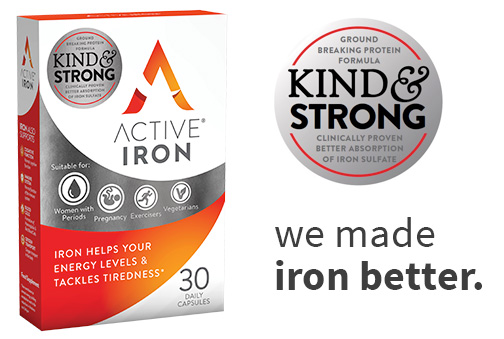How does giving blood
affect your iron levels?
The main adverse effect of blood donation is iron loss. Donating blood removes iron from your body which is needed to help maintain strength and energy.
Iron requirements can increase to as much as 30mg per day of daily iron for up to 6 months post donation. Iron helps with red blood cell production and haemoglobin formation, which are essential to life and well being.
The American Red Cross encourages all blood and platelet donors to learn how to maintain healthy iron levels and how blood donation impacts the level of iron in your body. Blood donors may benefit from taking an iron supplement if they are unable to replenish their iron stores through diet alone.
Information about your blood
- An average adult has between 10 and 12 pints of blood
- 7% of a person’s body weight is made up of blood
- Human blood travels 60,000 miles per day on its journey through the arteries, arterioles and capillaries and back through the venules and veins
- Blood carries oxygen and nutrients to all parts of the body
- Blood carries carbon dioxide and other waste products back to the lungs, kidneys and liver for disposal
- There are about 1 billion red cells in two to three drops of blood
How your body replaces blood
The average adult has around 10 pints of blood (roughly 8% of your body weight). Making a blood donation uses about 1 pint. Over time, your body can replace all the cells and fluids that have been lost through donation through a natural process called erythropoiesis, this process requires iron to produce haemoglobin for blood cell production.

Supporting red blood cells production
Your body continuously makes and breaks down blood cells. Approximately 2.4 million new erythrocytes (red blood cells) are produced per second in human adults. When you give blood you lose red cells and the body needs to make more to replace them. Special cells in the kidneys sense that the level of oxygen in the blood has decreased (due to the loss of red cells), and start secreting a protein called erythropoietin which sends a message to the body to say that more red blood cells are needed, rather than white cells or platelets.

How fast does your body make blood?
Following blood donation, it only takes a number of weeks to build up stores of them again providing you have adequate stores of iron. If you are a blood donor and find that you are unable to meet your iron needs through diet alone, you may benefit from an iron supplement.
Iron supplements for blood donors
Active Iron contains a ground-breaking iron formula that target the natural site of iron absorption in the small intestine, the DMT-1. These iron capsules contain a unique non-constipating formula that has clinically proven x2 better absorption than standard ferrous sulfate iron tablets.
